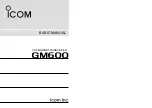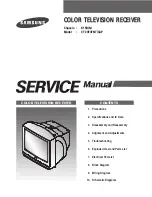
www.RFM.com
Technical s1.678.684.2000
Page 38 of 82
©2009 by RF Monolithics, Inc.
E-mail:
DNT2400 - 08/18/09
ARQ_AttemptLimit - this sets the maximum number of attempts that will be made to send a data packet
on the RF link. Setting this parameter to the maximum value of 63 is a flag value indicating that there
should be no limit to the number of attempts to send each packet (infinite number of attempts). This mode
is intended for point-to-point networks in serial data cable replacement applications where absolutely no
packets can be lost. Note - if this mode is used in a multipoint network, one remote that has lost link will
shut down the entire network if the base is trying to send it data.
MaxNumSlots - in TDMA access modes, this sets the number of slots that are allowed. In fixed slot mode,
this allocates the number of slots directly. In dynamic slot mode, this sets the maximum number of slots
that may be generated regardless of the number of remotes that attempt to link with the base. Any re-
motes requesting registration after this limit is reached will be denied registration by the base.
CSMA_Predelay - in CSMA mode 1, this parameter sets the maximum delay between when the base
transmission has finished and when a remote checks for a clear channel. Refer to Section 2.9.2 for more
information.
CSMA_Backoff - in a CSMA mode 1, this sets the length of time that a remote will back off after it detects
a busy channel. Refer to Section 2.9.2 for more information.
MaxPropDelay - this is the maximum propagation delay that the base and the remotes will use in their slot
timing calculations, in units of 3.1 µs. This is used to increase the amount of time dedicated to the regis-
tration slot. Increasing this value will subtract slightly from the overall slot time available to remotes for
sending data. Note that the free-space round trip propagation delay for one mile is 10.72 µs. Each incre-
ment of MaxPropDelay thus corresponds to a maximum radius from the remote to the base of 0.29 mi
(0.46 km). The default setting provides enough time to handle remotes up to 20 miles away. It is recom-
mended to use the default setting unless a path greater than 20 miles is planned at start up. Once linked
to the base, remotes will periodically update their timing based on ranging information from the base,
except in Polling Mode. The frequency with which this value is updated is set by the RangingInterval
parameter discussed below. The current range information is available in the CurrPropDelay parameter.
LinkDropThreshold - this is the number of consecutive beacons missed by a remote that causes the
remote to restart a link acquisition search. Please contact RFM technical support before making changes
to the parameter.
CSMA_RemtSlotSize - this sets the maximum size for a remote data transmission in polling or CSMA
channel access modes. Setting this parameter to a large value allows a remote to send more data in a
single hop, but can result in fewer remotes having time to send on a given hop. The default is 64 bytes.
CSMA_BusyThreshold - this sets the RSSI energy detection threshold that remotes use to determine
whether the channel is occupied. The factory default should be sufficient for most applications and it is
recommended that this value not be changed.
RangingInterval - this sets the period at which remotes will reassess their range to the base. Polling
(mode 0) disables the ranging interval mechanism, so remotes receive ranging information only once
each time they join a network. The RangingInterval timer does not advance while a remote is sleeping.
AuthMode - this parameter is valid on the base only. It controls how remotes are permitted to join the
network. Permitted values are:
















































